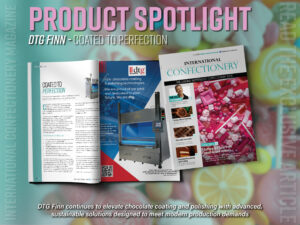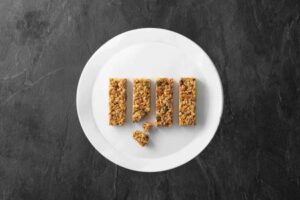One of the key events on the 2018 calendar for the confectionery world takes place in Cologne, with ProSweets set to demonstrate just how much ingredients are on the agenda.
ProSweets Cologne – the international supplier fair for the sweets and snacks industry will also be taking a look at the industry’s future in 2018. An important topic for the consumer: Less artificial ingredients, less sugar and fat, instead more natural tastes, colours and consistencies for sweets and snacks. In order to adapt the sensory and nutritional characteristics in a natural way, the manufacturers are making use of the opportunities of the ingredients supplier industry.
Market-leading companies such as Döhler, GNT and Olam are represented at ProSweets Cologne as well as smaller and medium-sized companies. ProSweets Cologne is once again being staged parallel to ISM, the world’s largest and most important trade fair for sweets and snacks and thus in the direct vicinity of its sales market.
A consumer study by Döhler Sensory & Consumer Science comes to the conclusion that over half of the consumers are interested in more healthy sweets and snacks and that they place great value on more than 60 percent of natural ingredients.
A trend that also a traditional company such as the bakery Coppenrath with its almost 200-year history is also not ignoring. Six sugar-free all-season cakes as well as two sugar and at the same time lactose-free almond cookies aim to address consumers, who want to enjoy food in a particularly conscious way. The example demonstrates that there is a stronger differentiation today compared to a few years ago when it comes down to sweets, biscuits and snacks.
Healthy foodstuffs are increasingly positioning themselves on the market according to the criteria what they don’t contain. Claims such as “sugar-free” and “lactose-free” are beginning to break away from their niche existence and becoming mainstream instead. “Brands particularly profit from marketing health and naturalness,” Julia Büch, Food and Drink Analyst at Mintel, also confirmed. The industry reacts to the preferences of the consumers with recipe adaptions and the development of new products.
Tender melting for sweets without sugar
The search for an alternative for sugar is reflected by the long-standing commitment of the food industry. The ingredients specialists are supporting the industry hereby with functional carbohydrates that are intended to replace the traditional granulated sugar without compromising the quality.
Product developers, who implement these cleverly combined with plant fibres can in this way reduce the calories and at the same time improve the mouthfeel, creaminess and texture. The concepts of Beneo, which are based on the sugar replacements isomalt and inulin, a natural fibre from the chicory root, are a prime example of this.
Thanks to its long-chain molecule structure, under shear force it forms a fat-like texture in water-based systems – which in the case of milk chocolate helps to reduce the fat content without affecting the melting characteristics to a large extent. In combination with isomalt, the sugar content can be reduced by over two thirds. The milk chocolate keeps the blood sugar level down low and can be marketed using the claim “without added sugar”.
Innovative production processes as a guarantee for success
The success of reformulated sweets underlies not least innovative processes, which in addition to the ingredients and packing materials are under focus at ProSweets Cologne. In the case of boiled chews it is particularly the sugar base that faces the product developers with challenges.
Chewing-gum with its dry kneading processes on the other hand enables a long-lasting taste experience without calories. Candy2Gum by Wacker unites both worlds: The technology enables chews to be produced that turn into chewing-gum in the mouth.
The basis is a ready-to-use premix, which can be completely melted down and which can be homogeneously mixed into sweet masses that contain sugar or that are sugar-free. The raw material enables chewing gum-like sweets to be cooked and formed into any desired shapes – in this way also water-based ingredients that contain fats as well as natural ingredients such as fruit juices, cocoa or coffee can be added.
The Wacker technicians spent two intense years of work perfecting the right mixture. Parallel to this the engineers of the sweet machine builder, Chocotech, adapted the machinery. They equipped a production line that is used to make hard caramels with an additional melting container including a pump and flow meter. The cooled down mass finally runs through a cut and wrap machine that cuts the sweets into bite-sized pieces and wraps them.
Natural alternatives
Whether fruit lollies, creamy chews or dark chocolate with matcha: The exhibitors of ProSweets Cologne are presenting a wealth of natural alternatives and aromas for a perfect sensory profile of sugar-reduced products. These include fruit extracts and stevioglycoside that is gained from the stevia plant, which are used in MultiSweet Fruit and MultiSweet Stevia offered by Döhler for instance.
In total, over 300 companies from the sections manufacturing, packing and ingredients are once again expected in Cologne from 28 to 31 January 2018. Experts explain at the stands how the all-in-one ingredient systems harmonise with the other recipe ingredients. Manufacturers, who want to expand their portfolio to include sugar or fat-reduced sweets and snacks, can find experienced contact partners for the development of new and innovative product ideas at the fair grounds.
The “Ingredients – Reformulation for Sweets & Snacks” special event continues to be part of the event programme of ProSweets Cologne. The DLG is once again offering tours to different exhibitors from the Ingredients section.
Furthermore, lectures on the theme of “Reformulation” are on the agenda at Speakers Corner again. The DLG also plays a leading role here too. The aim is to make background information available to the food industry that helps it choose the appropriate sensory and food-technological adaption measures. Since both the European Commission and the German Federal Government see the reduction of sugar, fat and salt as an important step in sustainably improving the dietary and exercise behaviour.
Further information is available at: www.prosweets-cologne.com and www.ism-cologne.com.
The exhibitor list of ProSweets Cologne 2018 is immediately available online.
Admission tickets can also be ordered already. As in 2017, the ProSweets Cologne admission tickets are also valid for visiting ISM and vice versa the ISM admission tickets entitle the holders to visit ProSweets Cologne.
ProSweets Cologne is sponsored by the Federal Association of the German Sweets Industry (BDSI), Sweets Global Network e.V. (SG), the German Agricultural Society (DLG e.V.) and the Central College of the German Sweets Industry (ZDS).
Koelnmesse – Global Competence in Food and FoodTec:
Koelnmesse is an international leader in organising food fairs and events regarding food and beverage processing. Trade fairs such as the Anuga, ISM and Anuga FoodTec are established world leaders. Koelnmesse not only organises food trade fairs in Cologne, Germany, but also in further growth markets around the globe, for example, in Brazil, China, Colombia, India, Italy, Japan, Thailand, the United States and the United Arab Emirates, which have different focuses and contents. These global activities enable us to offer our customers a network of events, which in turn grant access to different markets and thus create a basis for sustainable and stable international business.
Further Information is available at: http://www.global-competence.net/food/









